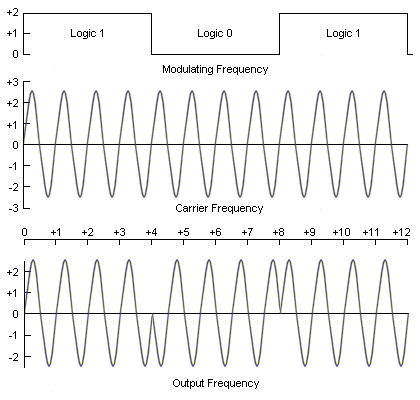| Author: | |
| Website: | |
| Page title: | |
| URL: | |
| Published: | |
| Last revised: | |
| Accessed: |
Phase-shift keying (PSK) is a method of modulating digital signals onto an analogue carrier wave in which the phase of the carrier wave is shifted between two or more values, depending upon the logic state of the input bit stream. The simplest method uses two phases - 0 degrees and 180 degrees. The logic state of each bit is examined with respect to the logic state of the preceding bit. If the logic state changes (i.e. from logic high to logic low) the phase of the carrier is shifted by 180 degrees. If the logic state does not change, the phase of the carrier remains the same. This form of PSK is sometimes called biphase modulation. The output waveform of a 2-phase PSK modulator is shown below.

Phase shift key modulation
More complex forms of PSK employ four or eight phases. This allows more bits to be transmitted for each phase angle used. In four-phase modulation, the possible phase angles are +45/-315, +135/-225, +225/-135, and +315/-45 degrees (a phase difference between symbols of 90 degrees), and each symbol can represent two signal elements (00, 01, 10 or 11). In eight-phase modulation, the phase difference between symbols is 45 degrees, and each phase shift can represent three signal elements (000, 001, 010, 011, 100, 101, 110, or 111).